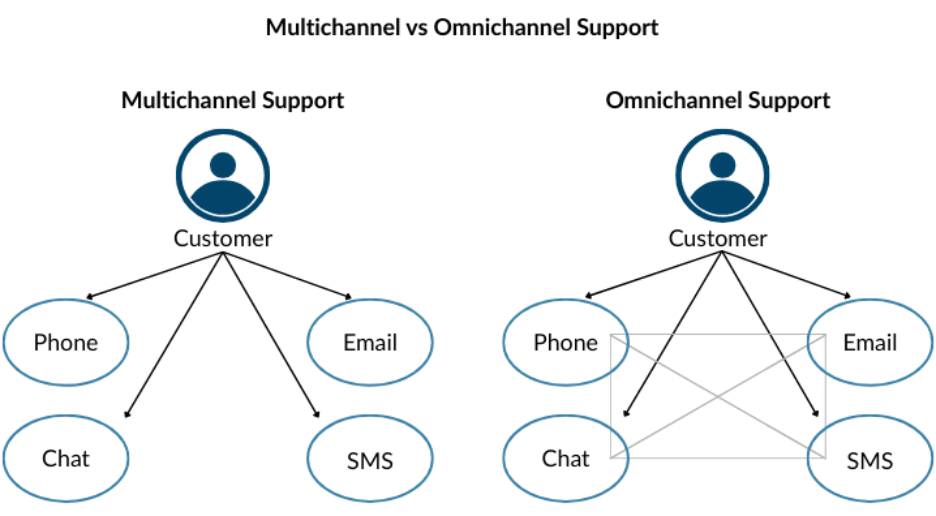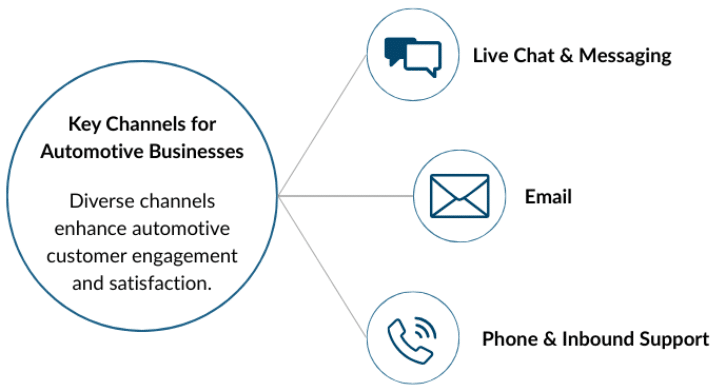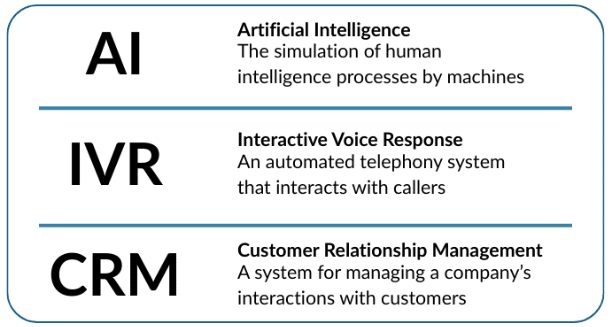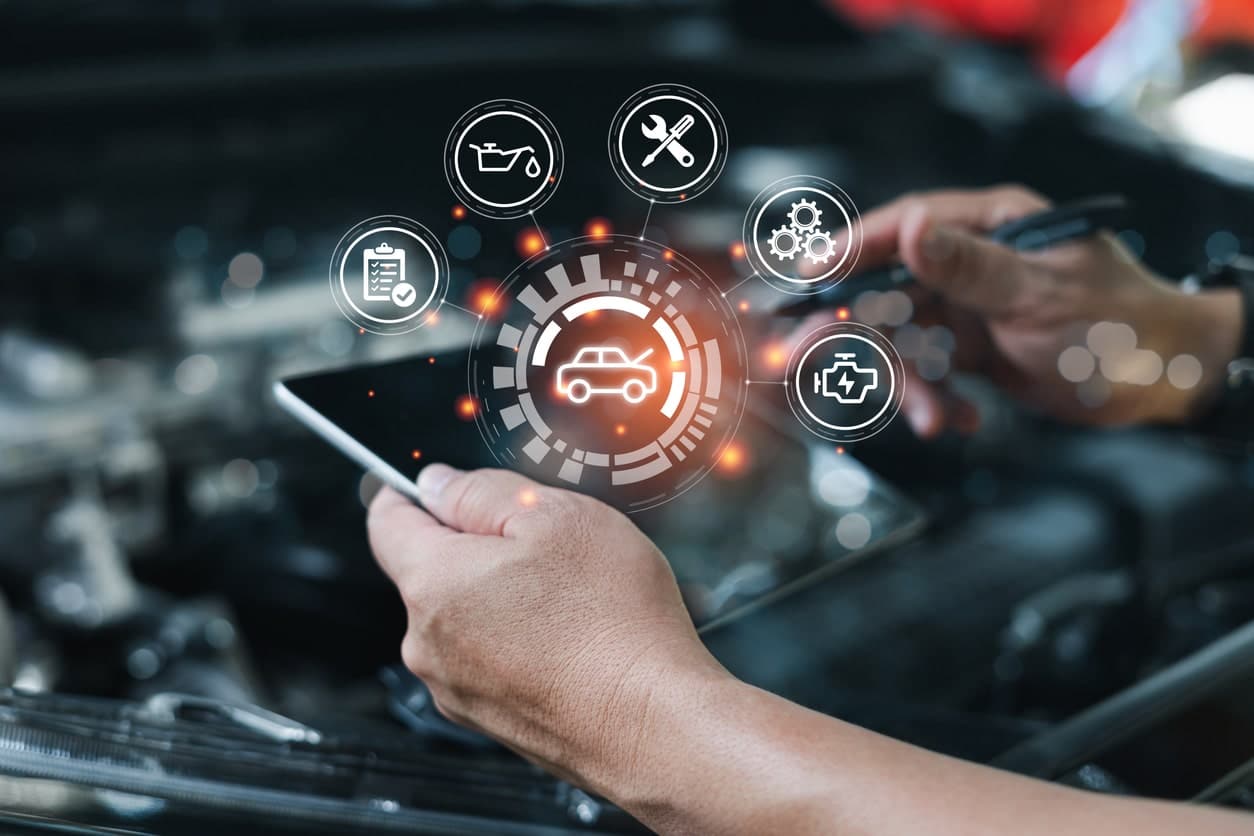Multichannel Support to Meet Automotive Customers Where They Are
Meeting automotive customers where they are means recognizing that today’s car buyers and service seekers no longer stick to a single channel. Instead, they expect seamless support across phone, chat, email, social media, and beyond—whichever option is most convenient at the moment. Multichannel support allows automotive businesses to deliver on this expectation, creating effortless, connected experiences that boost satisfaction, loyalty, and long-term revenue growth.
Read Time: 9 minutes
Table of Contents
The automotive industry is undergoing a major shift in how it connects with customers. No longer limited to phone calls or in-person visits, today's buyers expect quick, seamless support across multiple channels whether that's chat, email, social media, or traditional phone support. To stay competitive, automotive brands must adopt multichannel strategies that not only meet customer expectations but also create a smoother, more connected journey from start to finish.
Why Multichannel Matters in Automotive CX
Experiences in the automotive industry are not what they used to be. Instead of starting the journey on the phone and ending it at the actual store, most interactions have shifted to be online and involve multiple communication channels. With that comes the demand for customer support whenever and wherever the customer needs it. The automotive customer experience needs to be effortless.
This evolution reflects broader customer expectations across industries. Buyers want convenience, speed, and flexibility. Long wait times and limited contact options reflect a company that is out of touch and doesn't really care about their customers. Automotive brands need to invest in multichannel communication to survive.
A good multichannel strategy will:
- Elevate the automotive customer experience
- Meet customer expectations
- Create a more connected customer journey
This sets the foundation for long-term success in an incredibly competitive market.
The Evolution of Automotive Customer Support
Automotive support has come a long way. Typically, customers would have to call the dealership or service center to set appointments, finance, or ask for roadside assistance. Phone support still plays a crucial role in customer support, but there is so much more that needs to be provided.
Companies who want to succeed in the automotive industry must provide options for customers to start a conversation via chat, email, and social media. This change has transformed basic call centers into multichannel and omnichannel contact centers.
Multichannel vs. Omnichannel Contact Centers
Companies that only provide phone support are failing to meet customer expectations. Research done by McKinsey & Company reveals that customers will use three to five different channels to communicate with companies. Phone support is no longer enough, and this single-channel approach will only lead to missed opportunities and unhappy customers.
Traditional customer service models revolve around phone support, but omnichannel and multichannel contact centers integrate multiple communication methods to create a better experience.

Multichannel support provides several separate communication options that operate in silos. Omnichannel support goes one step further by integrating these channels, so agents have access to all previous interactions.
Brands will thrive in the automotive industry once they invest in omnichannel or multichannel support because it aligns them with automotive customer support trends. Call center outsourcing is an effective way that companies can meet these high standards and deliver exceptional service.
Key Channels Automotive Businesses Must Offer
For automotive businesses, success comes from providing customers with plenty of ways to connect. They want the freedom to reach out in the way that works for them. That might entail a quick chat online, a direct message on social media, or a phone call. Providing these options of communication can help reduce friction in buying and service processes, while improving customer satisfaction and loyalty. These channels create measurable opportunities for revenue growth and business prosperity.

Phone & Inbound Support
Phone support will most likely always be the backbone of automotive CX. It is needed for urgent services like emergency roadside assistance and immediate service appointments. Customers in those stressful situations want reassurance from a live agent, and phone support helps provide that essential human touch. Beyond that, customers still prefer to reach out to companies via a phone call. Strong inbound support provides peace of mind at every stage of the customer journey.
Live Chat & Messaging
For younger demographics, live chat support and messaging platforms are essential. Live chat provides instant access to answers, which means no waiting on hold. Customers might use chat for:
- Scheduling appointments
- Checking warranty information
- Asking quick service questions
Messaging is also a great option for sending out proactive reminders about maintenance, recalls, or appointments. Live chat is an excellent way to provide 24/7 customer support. Satisfaction improves when your customers can get support from your organization any time of the day.
Email Support
Email remains one of the most reliable channels for customer service with almost half of customers choosing it to resolve issues with a company. Automotive businesses can use email for everything from loan approval notifications to sending copies of invoices. Emails provide a clear communication trail that benefits both customers and businesses. Personalized emails are also a great way to provide customers with information on limited time offers and new services.
Payment & Billing Support
Billing and financing support are integral to the automotive customer journey. Customers expect secure support for loan payments and billing questions. A billing support outsourcing provider will help ensure brands are compliant with financial regulations while improving customer convenience. Effective billing support reduces errors that could damage trust. Offering multiple payment options and clear communication makes the financing process easier for customers.
How Multichannel Support Drives Business Outcomes
Automotive brands should view multichannel support as a strategic investment that drives loyalty and revenue. Providing support at every touchpoint helps reinforce brand trust and create long-term value. Multichannel support transforms customer service into a revenue-driving advantage.
Improved Customer Retention & Loyalty
A customer that can choose how they want to reach your brand is a customer that is likely to stick around. Multichannel support removes the frustration of only being able to communicate with a company one way and instead meet people on their terms. That flexibility goes a long way.
What really keeps customers company back is:
- Convenience: customers can choose how they want to contact a business without having to jump through hoops.
- Consistency: they get the same service on every channel.
- Personalization: feeling like the brand knows and values them.
Reliability will turn your customers into some of your biggest brand advocates.
Revenue Growth & Upselling Opportunities
Good support opens the door to new revenue. The right approach can turn these channels into upselling machines. Even something as simple as answering a late-night chat can turn into a booked appointment or a new sale.
ROI CX Solutions helped an automotive brand nearly triple the number of appointments set by scaling multichannel support and integrating their CRM with advanced telephony tools. Even better, the appointment-keep-rate stayed just as strong. This case is a great example of how multichannel support can boost both revenue and quality at the same time.
Operational Efficiency & Scalability
Customer demand isn't always steady. Spikes can occur at various points throughout the year and adjusting staff up or down can be challenging. That is where outsourcing to a multichannel contact center partner really helps because they allow you to scale without the headaches of hiring or training. They provide you with agents that are masters at automotive upselling and customer retention.
Outsourced call center benefits also include:
- Smarter workflows
- Reduced wait times
- Better resource allocation
This helps your company provide faster, more reliable service for your customers.
Technology That Powers Multichannel Automotive Support
Behind every great multichannel experience is the right technology. It is time for automotive companies to embrace AI, IVR, CRM integration, and analytics to provide smoother, personalized service.

The right tools improve response times and help brands take a more proactive approach with their customer support. The right method uses technology to enhance human touch, not erase it.
AI & IVR Integration
AI-driven chatbots and IVR systems are able to handle routine questions and route customers to the right agent quickly. This provides customers with fast responses and takes some of the pressure off staff.
Additionally, AI can learn from past interactions to provide smarter, more context-aware responses. IVR systems also give customers the flexibility to self-serve when they prefer. Together, they create a smooth experience that feels easy for the customer and efficient for the business.
CRM & Data Integration
Customers get frustrated when they have to repeat themselves to multiple agents, multiple times. Who wouldn't? A unified CRM gives agents a complete view of every single interaction.
Having access to this data will help agents anticipate customer needs and even create a more personalized experience.
Analytics & Performance Tracking
Great support comes from insight. Analytics will show where your customer support is struggling and what channels they prefer to communicate on most.
Some of the most important KPIs for automotive support include:
- Average Handle Time (AHT)
- Measures the total time an agent spends with a customer, including hold time and follow-up. This helps balance efficiency with quality.
- First Contact Resolution (FCR)
- Tracks whether a customer's issue is resolved in the first interaction. High FCR is critical for service calls or warranty questions.
- Customer Satisfaction Scores (CSAT)
- Shows how happy customers are with their experience. These scores will indicate whether interactions leave customers feeling confident about their vehicle service, purchase, or financing experience.
Analyzing KPIs provides companies with the ability to improve service in ways that matter to customers.
Choosing the Right Multichannel BPO Partner
For many automotive companies, outsourcing is the fastest and most effective way to deliver multichannel support. The partner you choose matters. The right BPO should bring industry expertise, security, and the ability to scale with your business.
When evaluating a partner, look for those who:
- Understand automotive operations
- Follow strict compliance standards
- Can quickly scale during busy periods
The right partner turns customer support into an asset that strengthens relationships and drives results.
Industry-Specific Expertise in Automotive
Generic outsourcing providers will often lack the knowledge needed to provide the proper support automotive customers need. The best automotive BPO solutions will have agents trained in automotive services, financing, and warranty support. This expertise not only provides a smoother customer experience, but also an enhanced one that keeps them coming back.
Potential providers should understand:
- Dealership operations
- Service scheduling
- Warranty inquiries
Another benefit of an experienced automotive BPO is they can also help with upselling throughout customer interactions. This brings in more revenue and also improves the customer journey.
Compliance & Security
Automotive customer data often involves sensitive financial and personal information. A strong BPO partner ensures secure customer support with compliance standards like PCI DSS for payment security and HIPAA if medical financing is involved. The right BPO partner will help you prioritize risk management and stay ahead of evolving data protection laws.
Compliance reflects a company's culture of accountability and a partner that treats data security as a priority brings value to your business.
Scalability & Flexibility
Automotive businesses face fluctuating demands and scaling can be challenging. A good outsourcing partner makes it easy. Adding this flexibility to your company helps provide customer support that never falters and your team benefits from always having enough people to help out.
A flexible BPO partner will also be able to support multiple time zones and languages. Your company can reach a wider audience and continue to grow. Scalability helps keep your brand responsive and reliable.
Meeting Customers Where They Are = Future-Proof Automotive CX
The automotive journey has evolved along with customer expectations. Brands embracing multichannel contact center solutions are already seeing benefits like higher revenue and smoother operations. Success does not come from technology alone; it comes from the right partner who understands the automotive industry and proactively works to satisfy customers and help the company grow. Automotive brands that invest in multichannel support secure a lasting competitive advantage.
Shift your customer support into high gear by connecting with ROI CX Solutions. Get a free quote today.







